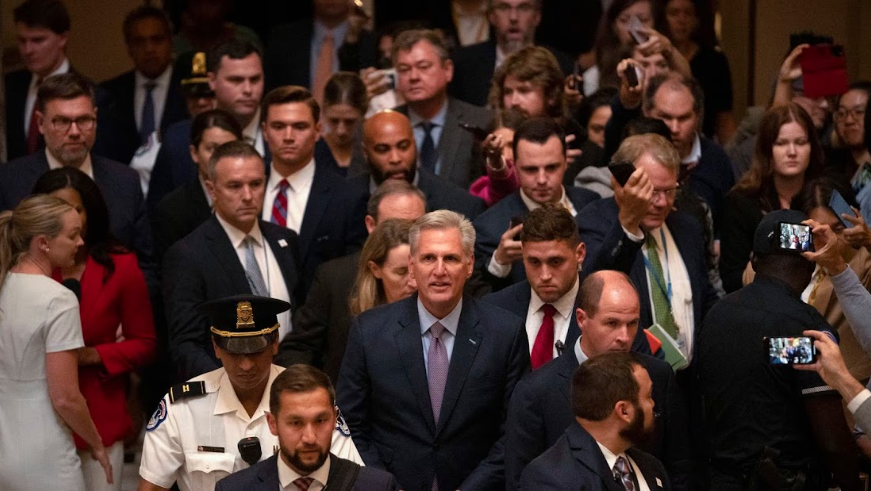Tuesday, October 3, the House of Representatives convened to vote on a resolution called to remove the present Speaker of the House Kevin McCarthy. The vote’s final results stood 216 to 210, removing the Republican California representative from his position and leaving the speakership role vacant. McCarthy remains the first speaker in U.S. history
who has lost the position through a vote of no confidence. He currently holds the title for the third shortest speakership. Now, the Republican members in the House of Representatives scramble to put forth a new candidate for Speaker.
Florida Representative Matt Gaetz introduced the resolution to motion a vote to vacate the office of the speaker Monday night. In his speech on the floor the same day, Gaetz defended the decision by attacking McCarthy’s handling of government spending and his decision to work with Democrats in a stopgap bill that temporarily prevented a government shutdown. He also accused McCarthy of creating a “secret deal” that delivered additional funding to Ukraine—a measure numerous Republicans have opposed. He further vocalized reasons to distrust McCarthy, calling to elect a trustworthy Speaker.
“I have enough Republicans where at this point next week, one of two things will happen: Kevin McCarthy won’t be the Speaker of the House or he’ll be the Speaker of the House working at the pleasure of the Democrats,” Gaetz said.
Gaetz has continually criticized McCarthy in the past and stood against McCarthy’s run for the office of the speaker back in January which resulted after an astonishing 15 ballots. Familiar faces composed of the Republican opposition against McCarthy’s run for Speaker also voted to remove him from his position. Republicans hold only a slim majority in the House where divisions in the party hold crucial outcomes. Factions such as the House Freedom Caucus and other far-right lawmakers within the party have resulted in party conflict and a Grand Old Party (GOP) civil war. McCarthy needed the support of nearly all of his party’s members to remain Speaker.
Eight Republicans joined House Democrats to vote for McCarthy’s removal, enough votes to oust the Republican representative. The other GOP lawmakers supporting Gaetz’s removal efforts voted against the bill put forth by McCarthy to keep the government running. Before the vote, House minority leader Hakeem Jeffries urged his fellow democratic lawmakers to vote against saving the California representative. McCarthy had worked with House Democrats days before to approve the stopgap bill that averted a government shutdown. Jeffries defended his decision, stating McCarthy’s own doings brought the situation upon himself by catering to GOP extremists.
“It is now the responsibility of the GOP members to end the House Republican Civil War. Given their unwillingness to break from MAGA extremism in an authentic and comprehensive manner, House Democratic leadership will vote yes on the pending Republican Motion to Vacate the Chair,” Jeffries said.
Immediately after announcing the seat of the Speaker vacant, Representative Patrick McHenry of North Carolina— a strong McCarthy ally—became the appointed Speaker Pro Tempore. McCarthy put McHenry first on a list submitted to the clerk of the House in the case of a vacant speaker position. The speaker pro tempore cannot perform the same duties a Speaker of the House can. McHenry cannot bring legislation to the floor or take it off and remains unable to sign off on any other official House business that would require the approval of the speaker. McHenry will serve as the temporary speaker over the essentially paralyzed Congress until the next election for speaker arises.
The need for a Republican nomination now persists as an impending government spending bill is set to expire next month. Tuesday evening, McCarthy publicly stated he will not run again for House speaker, setting the ground for the race to run as the next Republican nomination. Ohio Representative Jim Jordan and Louisiana Representative Steve Scalise have announced their bids to succeed McCarthy for the speaker role. For now, House Republicans plan to hold a candidate forum next Tuesday, and the House will elect a new speaker Wednesday, October 11.
“The fight over the speakership is about funding because those people who voted to remove McCarthy as speaker wanted individual bills to be passed. but what they’ve done since we only have 45 days to reach a continuing resolution is they’ve probably made it harder to actually get to real spending bills on these different departments. They’ve got maybe a week or two until we get a speaker. The likelihood of them being able to actually go through the complete process with a different bill and vote on them, the window is gonna be closing quickly to actually be able to accomplish them. So we’re probably going to have another continuing resolution,” AP US Government and Politics teacher Scott Trepanier said.
















